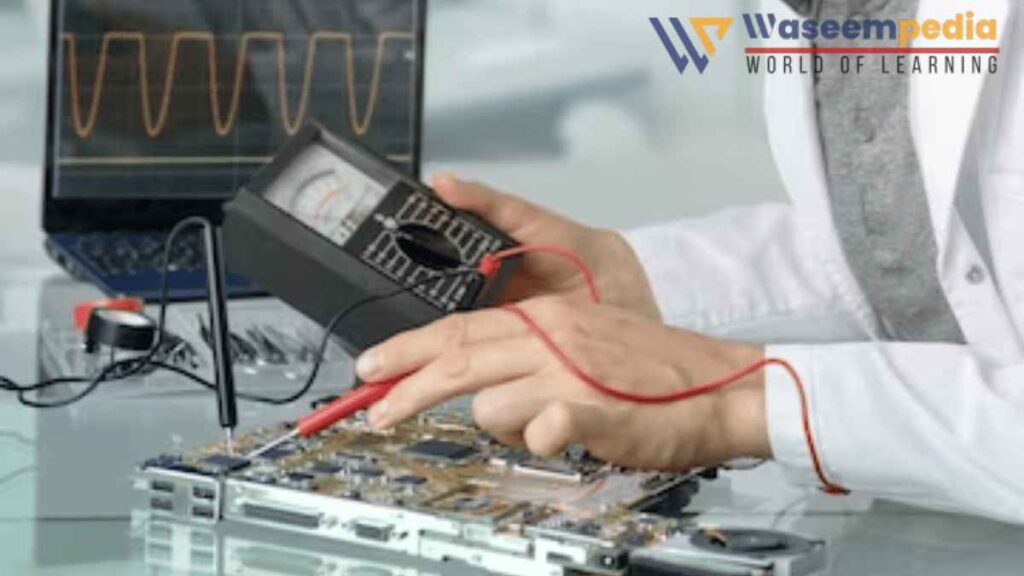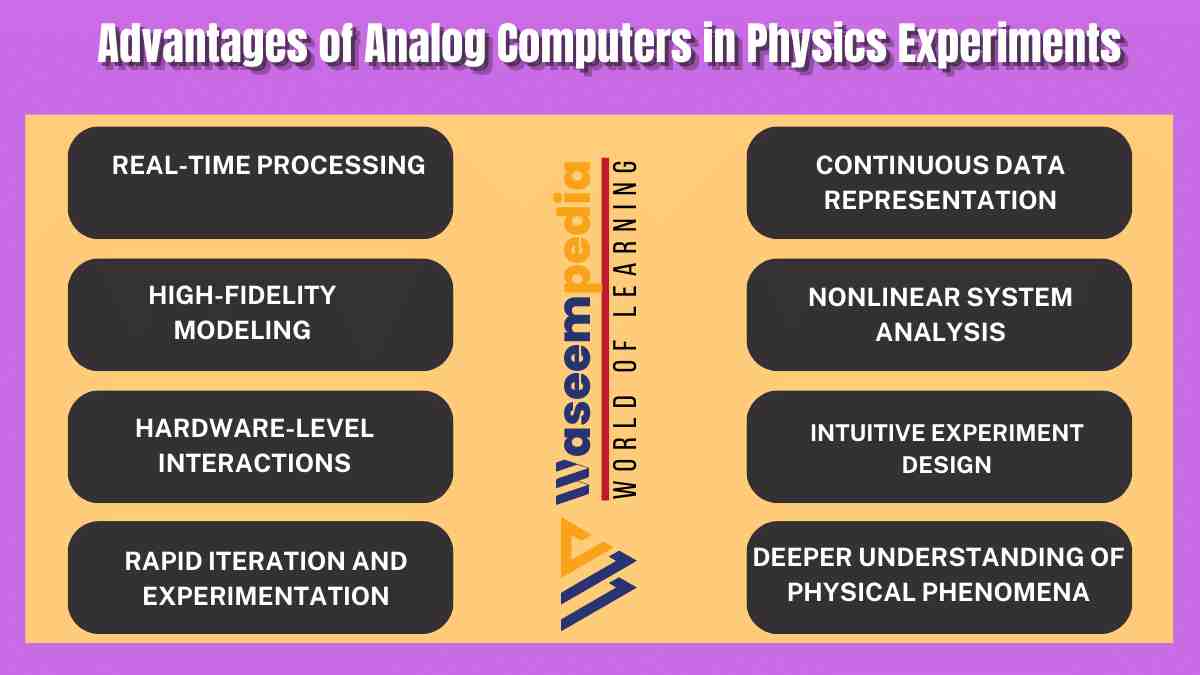Analog computers having many advantages in physics experiments like real-time processing, continuous data representation, high-fidelity modeling, nonlinear system analysis, hardware-level interactions, intuitive experiment design, and rapid iteration and experimentation. In this article, we will explore the advantages of analog computers in physics experiments and understand their significance in this domain.

While digital computers are prevalent in data analysis and simulation, analog computers continue to provide valuable tools for enhancing the experimental phase and gaining a deeper understanding of physical phenomena. The combination of analog and digital approaches can contribute to more accurate measurements, innovative experiment design, and advancements in scientific knowledge.
what is Analog Computers?
Analog computers process information using continuous physical quantities, such as voltages or currents, to represent and manipulate data. Unlike digital computers that operate on discrete values, analog computers can directly model and simulate the behavior of physical systems. In the context of physics experiments, analog computers offer an alternative approach to understanding and interpreting experimental data.
7 Advantages of Analog Computers in Physics Experiments
7 Advantages of Analog Computers in Physics Experiments are given below
1. Real-Time Processing
Real-time processing is essential in physics experiments, as it enables immediate analysis and response to changing experimental conditions. Analog computers excel in real-time processing due to their ability to work with continuous data streams without the need for digitization or discretization.
This real-time capability allows scientists to monitor experimental data, perform calculations, and make adjustments in real-time, facilitating accurate measurements and timely observations.
2. Continuous Data Representation
Analog computers utilize continuous data representation, enabling scientists to work with the fine-grained details of experimental data. Continuous data representation preserves the fidelity of experimental measurements without the quantization errors associated with digital systems. Analog computers provide a more accurate representation of physical phenomena, allowing scientists to analyze and interpret experimental data with higher precision.
3. High-Fidelity Modeling
Analog computers excel in high-fidelity modeling of physical systems. By directly simulating the continuous behavior of physical variables, analog computers can accurately capture the dynamics of complex physical phenomena. This high-fidelity modeling allows scientists to assess the behavior of physical systems under various conditions and gain deeper insights into the underlying principles and mechanisms.
4. Nonlinear System Analysis
Many physical systems exhibit nonlinear behavior, which can be challenging to analyze using traditional mathematical approaches. Analog computers are well-suited for analyzing and studying nonlinear systems.
The inherent ability of analog computers to process continuous signals and directly handle nonlinear relationships between variables enables scientists to explore the behavior and dynamics of these complex systems. Analog computers enable the study of chaotic behavior, complex oscillations, and other nonlinear phenomena in physics experiments.
5. Hardware-Level Interactions
Analog computers enable hardware-level interactions in physics experiments. Scientists can directly interface analog computers with physical sensors, detectors, and other measurement devices to collect real-time data.
This hardware-level interaction enhances the accuracy and timeliness of experimental measurements, as scientists can evaluate the behavior of physical systems and assess data in real-time with direct connections to physical components.
6. Intuitive Experiment Design
Analog computers offer an intuitive approach to experiment design in physics. Scientists can physically connect and manipulate analog components to design and modify experimental setups.
This hands-on interaction allows for a deeper understanding of the relationships between experimental parameters and physical phenomena. Analog computers provide an intuitive platform for scientists to explore and experiment with different setups, facilitating innovative and creative experiment design.
7. Rapid Iteration and Experimentation
Analog computers facilitate rapid iteration and experimentation in physics experiments. Scientists can quickly modify experimental parameters, observe the immediate effects on the measured data, and make real-time adjustments.
Analog computers offer a hands-on approach to experimentation, allowing scientists to interact directly with the experimental setup and explore different scenarios. This iterative process of experimentation accelerates learning, optimization, and the discovery of new insights.
Related FAQ’s
How do analog computers differ from digital computers in physics experiments?
Analog computers process continuous data and directly model physical behavior,
while digital computers operate on discrete values and rely on algorithms for data analysis and simulation.
What advantages do analog computers offer in physics experiments?
Analog computers excel in real-time processing, continuous data representation, high-fidelity modeling, nonlinear system analysis, hardware-level interactions, intuitive experiment design, and rapid iteration and experimentation.
Why is real-time processing important in physics experiments?
Real-time processing allows scientists to monitor experimental data, perform calculations, and make adjustments in real-time, facilitating accurate measurements and timely observations.
How do analog computers handle nonlinear systems in physics experiments?
Analog computers can directly model and simulate the behavior of nonlinear systems, enabling scientists to study and analyze complex dynamics and phenomena.
Why are hardware-level interactions valuable in physics experiments?
Hardware-level interactions allow scientists to interface analog computers with physical measurement devices, enhancing the accuracy and timeliness of experimental measurements.

